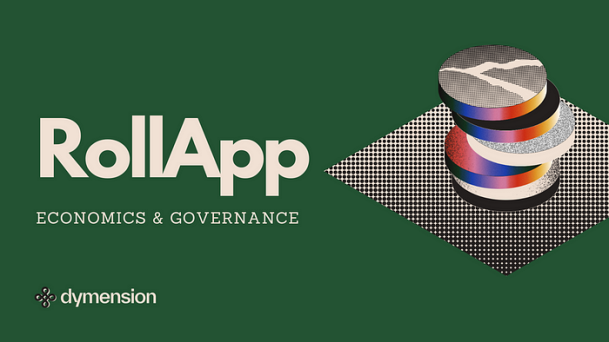
Dymension's RollApp Development Kit (RDK) is a convolutional framework that enables online communities and applications to operate as decentralized, autonomous, and cryptographically secure economies. The goal of RollApps is to experiment and find the best economic and technical structure that enables online collectives to operate efficiently and securely.
Separation of Computation and Governance
I. Sequencers handle computation
RollApps leverage the economy and decentralized network of the Dymension Hub. In order to access the network without permission, node operators bond capital on the Dymension Hub to gain the right to generate blocks on the RollApp (i.e. become a Sequencer). The block generation rights obtained by Sequencers are similar to validators in Proof of Stake (PoS) blockchains. The allocated time comes from the relative share of tokens bonded on the Dymension Hub, creating an open and decentralized system.
The following assets are eligible for Sequencer Bonding:
Native DYM: Sequencers can bond Dymension Hub’s native token (DYM) to gain the right to generate blocks on RollApp.
RollApp Tokens: Through Dymension Hub’s AMM mechanism, Sequencers will be able to stake RollApp’s native tokens once approved by Dymension Hub governance.
LP DYM/ROLLAPP Tokens: Dymension Hub’s AMM mechanism allows for bonding of LP positions. Dymension Hub’s native protocol token DYM needs to be the underlying asset of the liquidity pool. The other side of the liquidity pool can be RollApp’s own native token. This is similar to the Super Fluid Staking developed and put into production by the Osmosis team.
2. Governors manage RollApp
While RollApp Sequencers are responsible for node operations and block generation, RollApp “Governors” manage on-chain governance, separating governance obligations from block producers. We refer to RollApp’s governance as “Governors”.
Governors are similar to RollApp’s board members or elected representatives, and their relative power comes from token delegation. Governors have full control over on-chain governance and value accumulation mechanisms such as fee collection, token minting, and NFT royalties. RollApps can be viewed as akin to a country’s DAO, with the following structure:
Working Class — RollApp Block Producers (i.e. Sequencers)
Parliament — RollApp Governors
Citizens — RollApp Token Holders
Similar to DPoS blockchains, Governors can receive token delegations from token holders, which increases the power of the chosen Governor, and in return, delegators receive dividends similar to staking with validators.
Revenue and Dividends
Transaction fees and block rewards are shared between Governors, Delegators, and Sequencers. The exact distribution is defined by a parameter, called the labor parameter, which divides block revenue between the operator and the community. This parameter is located in the application logic of RollApp and can be changed through governance.
Through this mechanism, RollApps achieves a decentralized, distributed economic structure, ensuring the balance and coordination of the interests of all parties.
Future Outlook of RollApp
RollApp is designed not only for current needs, but also for future expansion and innovation. Through continuous experimentation and optimization, RollApp is able to adapt to changing market needs and technological advances.
Technological Innovation: RollApp's technical architecture allows for rapid iteration and innovation. Through tight integration with Dymension Hub, RollApp can leverage the latest blockchain technology and decentralized finance (DeFi) tools to enhance its functionality and security.
Economic Model: RollApp's economic model is based on the principles of decentralization and community-driven. Through token economics and governance mechanisms, RollApp is able to create a sustainable and fair economic system that provides incentives for all participants.
Community Governance: RollApp's governance structure emphasizes community participation and decision-making. Through a decentralized governance mechanism, RollApp ensures that the opinions of all stakeholders are heard and considered, resulting in more democratic and transparent governance.
Conclusion
Dymension's RollApp Development Kit (RDK) provides a powerful framework that enables online communities and applications to operate as decentralized, autonomous, and cryptographically secure economies. Through the separation of computation and governance, innovative economic models, and strong community governance, RollApps offer unlimited possibilities for the future Internet economy.
The success of RollApp lies not only in its technology and economic model, but also in its firm commitment to decentralization and community-driven. Through continuous experimentation and optimization, RollApp will continue to lead the future development of the decentralized economy.